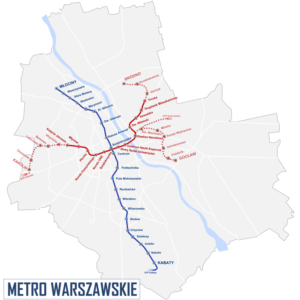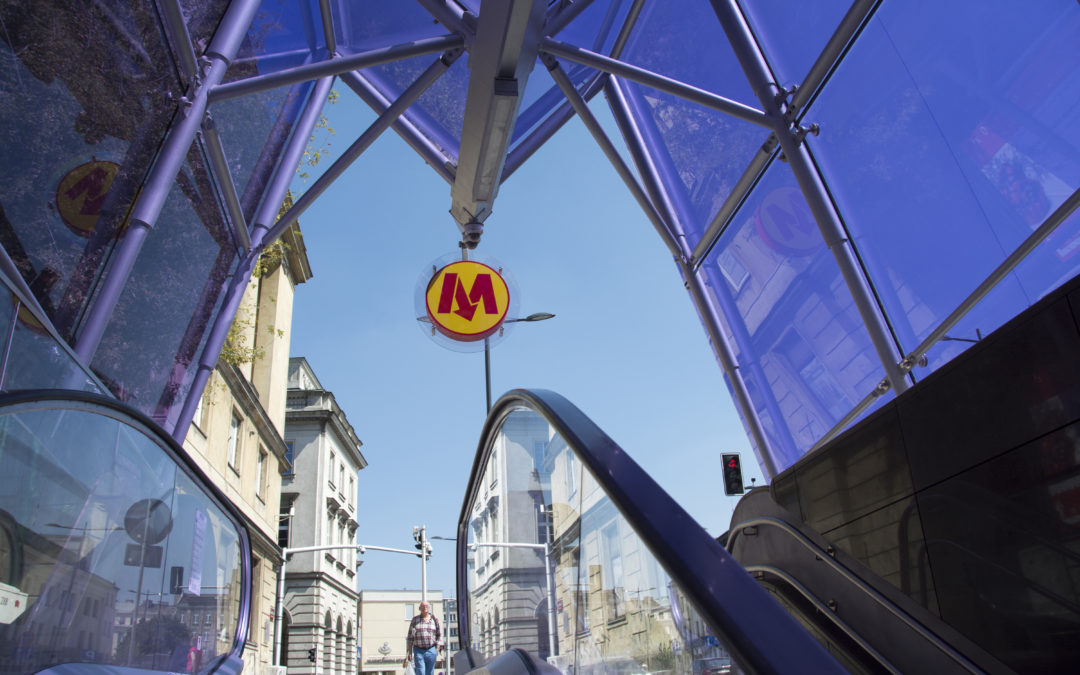Since launching in 2015, Warsaw’s second metro line, running along the capital’s east-west axis, has had its reach gradually extended. The latest expansion was completed in April this year, when three new stations opened.
However, bureaucratic delays, environmental checks and land disputes mean that the full planned extension may no longer be completed by the 2023 deadline, and has accrued additional costs.
In 2012, Warsaw began the construction of a second metro line, 17 years after the opening of the first, which runs on a north-south axis. By 2023, the completed line is supposed to have 21 stations along 23 km of underground tracks.
 Turkish construction firm Gülermak was commissioned in November 2018 to complete the three western-most stations on the line – Lazurowa, Chrzanów and Karolin – along with connecting tunnels and a further technical stop. But the company has been unable to begin work until it receives approval from the regional authorities.
Turkish construction firm Gülermak was commissioned in November 2018 to complete the three western-most stations on the line – Lazurowa, Chrzanów and Karolin – along with connecting tunnels and a further technical stop. But the company has been unable to begin work until it receives approval from the regional authorities.
In May, the governor of the Mazovia Province, in which Warsaw is located, approved three new locations. A further three are still awaiting a final decision.
The metro company, Metro Warszawskie, also requires approval from the General Directorate of Environmental Protection (GDOŚ), which will assess the environmental impact of the investment before giving it the final green light.
Initial approval was given, reports Gazeta Wyborcza, but some residents along the planned route of the line submitted appeals against it. GDOŚ has therefore asked Metro Warszawskie to carry out further actions before reassessing the case in August.
The delays and additional bureaucracy have cost Metro Warszawskie, which is owned by the city, half a million zloty, one of its officials told Gazeta Wyborcza. The deadline for completing the works by November 2023 may no longer be feasible.
It is likely that there will be further legal appeals from landowners along the path of the extended line, reports the newspaper. But a spokeswoman for Metro Warszawskie, Anna Bartoń, says that, even if so, that will not suspend further work.
Bartoń says, however, that some construction work has had to “slow down or stop” during the coronavirus epidemic.
There are also concerns that the ballooning costs of the metro line’s extension to under-developed outer areas of the city has come at the expense of other, perhaps more urgent, urban projects.
#SpełniamyObietnice – rozwijamy sieć #metro w @warszawa! Dziś wmurowaliśmy kamień węgielny pod budowę stacji Powstańców Śląskich. Od początku kadencji oddaliśmy do użytku 6 nowych stacji #metro2. Na obecny etap rozbudowy linii M2 otrzymamy prawie 2 mld zł wsparcia z #FunduszeUE! pic.twitter.com/7X6ym26fHU
— Rafał Trzaskowski (@trzaskowski_) May 28, 2020
Meanwhile last Thursday, Warsaw’s mayor Rafał Trzaskowski laid the foundation stone of the planned Powstańców Śląśkich station in Bemowo district. “We are keeping our promises,” said the mayor, who is the main opposition candidate in this year’s presidential election.
In April, three new stations opened in Warsaw’s Wola district – Księcia Janusza, Młynów and Płócka, with jazzy designs which have become a feature of many of the capital’s new stations.
Otwarto trzy nowe stacje II linii #metro na Woli: Księcia Janusza, Młynów i Płocka. Prezydent @trzaskowski_ apeluje jednak, by wstrzymać się z wizytą na stacjach jeśli nie jest to konieczne@WTP_Warszawa @warszawa #koronawirus #COVID2019
Czytaj więcej: https://t.co/kLPHdaIAjo pic.twitter.com/YHWOHRNDrk
— Polskie Radio RDC (@rdcpolskieradio) April 4, 2020
Warsaw’s metro was launched over 25 years ago. Subsequent segments were added to the north-south M1 line in 1998, 2001, 2003, 2005, and finally in 2008. The line is used by about 550,000 people each day.
The second line, M2, which began operating in 2015, has around 215,000 daily passengers. Warsaw’s metro company is already planning a third line, that would start in Praga-Południe district, for which it has already commissioned a technical study, reports Inzynieria.com.
Main image credits: iwishmynamewasmarsha/Flickr (under CC BY-NC 2.0)

Maria Wilczek is deputy editor of Notes from Poland. She is a regular writer for The Times, The Economist and Al Jazeera English, and has also featured in Foreign Policy, Politico Europe, The Spectator and Gazeta Wyborcza.




















